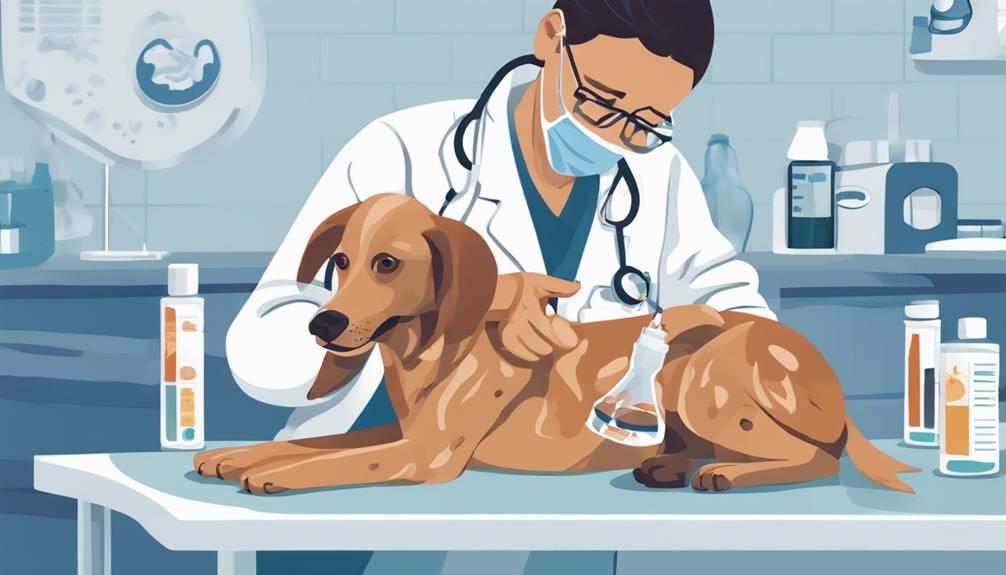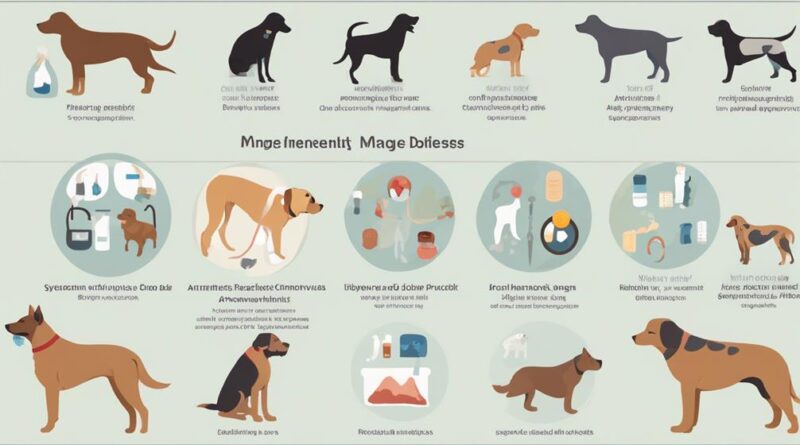Guide to Treating Common Canine Diseases
When treating common canine diseases, act swiftly for best results. Ensure your dog's health with appropriate vaccinations and recognize symptoms early on. Consulting your vet promptly and following a tailored treatment plan diligently is essential. For conditions like Kennel Cough, provide soothing remedies and rest, consulting a vet for severe cases. Prevent heartworm by exploring natural remedies and prompt treatment. Seek veterinary care promptly for diseases like Canine Distemper and Giardia infection. By prioritizing your dog's well-being and working closely with your vet, you pave the way for effective treatment and recovery.
Canine Parvovirus Treatment
When treating Canine Parvovirus, it's crucial to act swiftly to increase the chances of a successful recovery for your furry companion. This viral disease can be severe, especially in puppies and unvaccinated dogs. The Parvovirus vaccine is highly effective in preventing this illness, so make sure your dog is up to date with their vaccinations to reduce the risk of infection.
Recognizing Parvovirus symptoms early on is vital. Look out for signs such as severe vomiting, bloody diarrhea, lethargy, and loss of appetite. If you notice any of these symptoms, contact your veterinarian immediately for guidance. Quick action can make a significant difference in your dog's recovery process.
Upon diagnosis, your veterinarian will tailor a treatment plan based on the severity of the infection. Treatment often involves hospitalization to provide intravenous fluids, medications to control vomiting and diarrhea, and supportive care to boost your dog's immune system. It's essential to follow your vet's instructions diligently and keep a close eye on your dog's progress during treatment.
Kennel Cough Remedies
To alleviate kennel cough symptoms in your dog, consider implementing soothing remedies recommended by your veterinarian. Kennel cough, also known as canine infectious tracheobronchitis, is a common respiratory infection in dogs that can lead to a persistent cough, sneezing, and nasal discharge. While it usually resolves on its own, there are natural remedies and home care techniques that can help ease your dog's discomfort during this period.
One effective natural remedy is honey. Its antimicrobial properties can help soothe your dog's throat and reduce coughing. You can mix a teaspoon of honey into your dog's food or water to provide relief. Another remedy is steam therapy. Creating a steam-filled bathroom and allowing your dog to inhale the warm, moist air can help loosen congestion and ease coughing.
In terms of home care, ensuring your dog gets plenty of rest is crucial for a speedy recovery. Avoid exposing your dog to smoke, dust, or other irritants that can exacerbate the cough. Additionally, maintaining proper hydration by providing fresh water at all times can help keep your dog comfortable.
While these remedies can help alleviate kennel cough symptoms, it's essential to consult your veterinarian for a proper diagnosis and treatment plan. In severe cases or if symptoms persist, medical intervention may be necessary. By combining natural remedies and home care with professional guidance, you can help your furry companion recover from kennel cough more comfortably.
Heartworm Prevention and Treatment
If your furry friend is at risk of contracting heartworm disease, taking preventive measures is paramount to their well-being. Heartworm prevention is key in safeguarding your dog's health. While conventional medications prescribed by veterinarians are highly effective, some pet owners prefer exploring natural remedies. Natural options such as neem oil, diatomaceous earth, and essential oils like lavender and peppermint are believed to have some repelling effects on mosquitoes, which are carriers of heartworm larvae.
In the unfortunate event that your dog does get infected, prompt heartworm treatment is crucial. Traditional treatment involves medication that can be costly and may have side effects. However, there are alternative medication options that some pet owners consider. These alternatives might include herbal treatments or homeopathic remedies. It's essential to discuss these choices thoroughly with your veterinarian to ensure they're safe and effective for your dog's specific condition.
Leptospirosis Management
Managing leptospirosis in your dog requires prompt action and close collaboration with your veterinarian to ensure effective treatment and recovery. Leptospirosis is a serious bacterial infection that can affect your dog's liver and kidneys, potentially leading to severe complications if not addressed promptly. Here are essential points to consider:
- Leptospirosis vaccination effectiveness: Vaccination is key to preventing leptospirosis in your dog. Ensure your furry friend is up to date on their vaccinations, including the leptospirosis vaccine, which can significantly reduce the risk of infection. Discuss with your veterinarian the appropriate vaccination schedule based on your dog's lifestyle and risk factors.
- Leptospirosis transmission prevention: Leptospirosis is typically spread through contact with contaminated water or soil, as well as the urine of infected animals. To prevent transmission, avoid letting your dog drink from stagnant water sources outdoors and minimize exposure to potentially contaminated environments. Additionally, practicing good hygiene, such as washing your hands after handling your pet, can help reduce the risk of infection.
Lyme Disease Treatment Options
Promptly addressing Lyme disease in your dog is crucial to their well-being. Prevention is key, so ensure effective tick prevention measures are in place. If your furry friend does contract Lyme disease, early detection and treatment are vital. Antibiotic therapy is the primary course of action to combat this disease effectively. Your veterinarian will prescribe the appropriate antibiotics based on the severity of the infection.
When it comes to tick prevention, there are various options available, including spot-on treatments, tick collars, and oral medications. Regularly checking your dog for ticks, especially after outdoor activities, can also help prevent Lyme disease. Removing ticks promptly and correctly is essential to reduce the risk of infection.
If your dog is diagnosed with Lyme disease, antibiotic therapy will be initiated. It's crucial to follow the prescribed treatment plan diligently. Antibiotics help eliminate the bacteria causing the infection and prevent the disease from progressing. Monitor your dog for any side effects and keep in touch with your veterinarian throughout the treatment process.
Canine Distemper Care
To effectively care for a dog with Canine Distemper, it's essential to prioritize prompt and thorough veterinary attention. Canine Distemper is a serious viral disease that affects a dog's respiratory, gastrointestinal, and nervous systems.
Here are some key points to consider in caring for a dog with Canine Distemper:
- Prompt Veterinary Care: Seeking immediate veterinary care is crucial in managing Canine Distemper. Veterinarians can provide the necessary treatment and support to help your dog recover.
- Holistic Approach: A holistic approach to treating Canine Distemper involves addressing not only the physical symptoms but also the emotional and environmental factors that can impact your dog's recovery. This approach aims to improve your dog's overall well-being during the treatment process.
- Home Remedies: While home remedies can complement veterinary care, it's essential to consult with your veterinarian before trying any home treatments. Simple measures like keeping your dog hydrated, providing a comfortable resting area, and offering nutritious food can aid in their recovery process.
Giardia Infection Treatments

When dealing with Giardia infection in your dog, it's crucial to understand the available treatment options recommended by veterinarians. Giardia is a common intestinal parasite that can cause diarrhea and dehydration in dogs. To combat this infection, there are two main types of treatments: natural remedies and veterinary medications.
Natural remedies can be used as a complementary approach to veterinary medications. Probiotics, such as yogurt or specially formulated supplements, can help restore the balance of good bacteria in your dog's gut, aiding in the recovery process. Additionally, incorporating bland foods like boiled chicken and rice can be easier on your dog's digestive system while fighting off the infection.
On the other hand, veterinary medications prescribed by your veterinarian are often the primary treatment for Giardia infections. These medications include antiparasitic drugs that specifically target and eliminate the Giardia parasites from your dog's system. It's crucial to follow your vet's instructions carefully regarding dosage and duration of treatment to ensure the infection is completely eradicated.
In some cases, a combination of natural remedies and veterinary medications may be recommended for a comprehensive treatment approach. Always consult with your veterinarian to determine the most effective treatment plan for your dog's specific condition. By being proactive and seeking appropriate treatment, you can help your furry companion recover from Giardia infection and prevent future recurrences.
Rabies Prevention and Treatment
For effective prevention and treatment of rabies in your dog, understanding the importance of timely vaccinations is crucial. Rabies is a serious viral disease that affects the central nervous system of mammals, including dogs. Here are some key points to consider:
- Rabies Vaccination Importance and Prevention Strategies
- Ensure your dog receives regular rabies vaccinations as recommended by your veterinarian.
- Keep your pet away from wildlife and unknown animals that could potentially be carriers of the rabies virus.
- In case of any possible exposure to rabies, seek immediate veterinary care for evaluation and guidance on next steps.
When it comes to rabies post-exposure protocol and treatment options, it's vital to act swiftly. If your dog is bitten or scratched by an animal that could potentially have rabies, follow these steps:
- Rabies Post-Exposure Protocol and Treatment Options
- Thoroughly clean the wound with soap and water.
- Contact your veterinarian or local animal control immediately for further instructions.
- Your dog may need a rabies booster shot and observation to ensure the virus doesn't manifest.
Frequently Asked Questions
Can Canine Parvovirus Be Transmitted to Humans?
Canine parvovirus can't be transmitted to humans, so you don't need to worry about catching it from your furry friend. Understanding the transmission risk is crucial, but rest assured, this disease is specific to dogs.
To ensure human prevention, just focus on keeping your pup healthy and getting them vaccinated as recommended. By staying informed and proactive, you can help protect both your pet and yourself from this illness.
Is Kennel Cough Contagious Between Dogs of Different Breeds?
Kennel cough can be contagious between dogs of different breeds. Cross breed transmission is common in kennel environments where dogs mingle closely. The risks are higher in such settings due to the close contact and shared air supply.
It's important to monitor your dog's health and take precautions to prevent the spread of kennel cough, such as vaccination and good hygiene practices. Remember, prevention is key in keeping your furry friend healthy.
Are There Natural Remedies for Heartworm Prevention?
Yes, there are natural remedies for heartworm prevention. Herbal supplements can be part of a holistic approach to help protect your dog against heartworms. These supplements can support your dog's immune system and overall health, potentially reducing the risk of heartworm infection.
Remember to consult with your veterinarian before starting any new preventative measures to ensure they're safe and effective for your furry friend.
Can Leptospirosis Be Prevented Through Vaccination?
Yes, leptospirosis can be prevented through vaccination. Vaccination is a crucial part of canine disease control strategies. By ensuring your dog receives the proper vaccines, you can significantly reduce the risk of them contracting leptospirosis.
Talk to your veterinarian about the best vaccination schedule for your furry friend to keep them safe and healthy.
How Soon After a Tick Bite Should Lyme Disease Be Treated?
After a tick bite, it's crucial to seek early treatment for Lyme disease. The sooner you address it, the better the outcome. Look out for symptoms like fever, fatigue, and joint pain.
Prevention measures include using tick repellents, checking your dog for ticks regularly, and promptly removing any ticks you find. Remember, prompt action is key in managing Lyme disease effectively.
Conclusion
In conclusion, it's important to be proactive in preventing and treating common canine diseases to ensure the health and well-being of your furry companion.
By staying informed about the symptoms and treatment options for diseases such as parvovirus, kennel cough, heartworm, leptospirosis, Lyme disease, distemper, Giardia infection, and rabies, you can help keep your dog healthy and happy.
Remember to consult with your veterinarian for personalized recommendations and guidance. Your dog's health is worth the effort.
